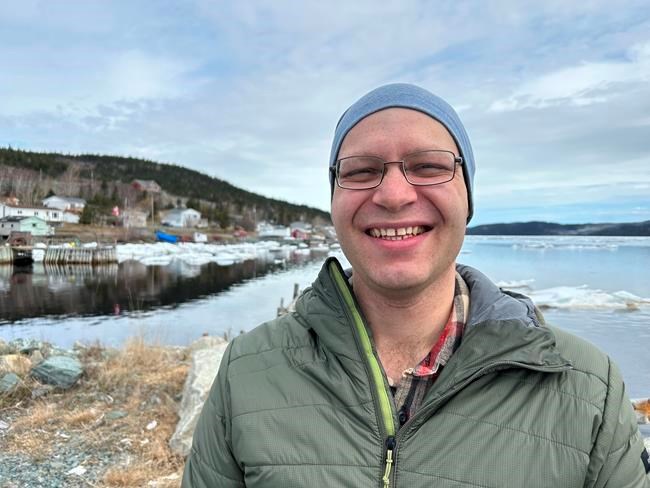ST. JOHN'S, N.L. — Stanislav Vasylchuk is more than 6,000 kilometres from home, and he's the only Ukrainian in the remote Newfoundland mining town of Baie Verte, a community of about 1,300 people surrounded by scrubby northern woods and towering rocky slopes. There are no hip cafés where the 29-year-old engineer might meet people. There isn't even a set of stoplights.
But he loves it. He hikes, he goes to barbecues, he does yoga at the gym and he lives next to the ocean. "I don't know how to explain it," he said in a recent interview over Zoom. "It's beautiful. It's just beautiful."
Vasylchuk arrived in Newfoundland a year ago Tuesday, part of a provincial government-led effort to bring Ukrainians fleeing the war to a province with a dwindling rural population. But after the company running the Baie Verte gold and copper mine where he worked declared insolvency last month, he's in the same boat as so many rural Newfoundlanders who've had to leave: he needs a job.
Vasylchuk was aboard the first of four planes chartered by the provincial government to transport displaced Ukrainians. It landed in St. John's, N.L., late in the evening on May 9, 2022, its passengers greeted by a welcoming local crowd.
Newfoundland and Labrador is home to the country's oldest and most rapidly aging population, driven by decades of out-migration in rural parts of the province. Young people leave in search of jobs when they can't find one at home, and they leave their aging parents behind.
The provincial government is counting on immigration to fill those gaps, and it established a satellite office in Warsaw, Poland, shortly after Russia launched its first attacks on Ukraine. Government employees there worked with citizens, staff and immigration organizations back in Newfoundland and Labrador to help the Ukrainians find jobs and places to stay before they arrived.
More than 2,400 Ukrainians have since settled in more than 30 different communities in the province, according to the Association of New Canadians.
Vasylchuk, who goes by Stan, stepped off the plane with a job as an engineering technologist lined up at the Baie Verte mine owned by Rambler Metals and Mining. For the first few months, he stayed at a hotel in St. John's with dozens of other newly arrived Ukrainians while resettlement workers helped him get a driver's licence and insurance and set up a bank account.
He then hopped on the bus for a six-hour journey across Newfoundland to the Baie Verte Peninsula. When he showed up for work, there were signs welcoming him in Ukrainian, he said.
People in Baie Verte are still supporting him, he said. They helped him find a cheaper place to rent when he lost his job, and people in the mining industry helped him attend a conference in Gander, N.L., in late April so he could meet more peers and employers, he said. They're also helping him get set up to obtain certification as an engineer in training.
"I would say I'm quite lucky," he said. "A lot of people have helped me."
The smallness of his new community, Vasylchuk said, "is nothing I need to get used to." He grew up in the village of Dubiivka, in central Ukraine, which is much smaller than Baie Verte, though the land looks completely different. The woods in Ukraine are thicker, with taller trees, he said, and the central region is full of wheat fields.
"You know, the flag of Ukraine? If you see it, it is yellow on the bottom and blue on the top," he said. "The place where I lived, that's what it looks like."
In Newfoundland, where the blue skies are a little rarer, he said he loves to climb to the 335-metre summit of a popular local hiking trail and look out over the hills.
Vasylchuk has a graduate degree and he's qualified to work in several countries. He's lived in big cities in Germany and the Czech Republic, but he said he prefers small communities.
He had long dreamed of emigrating to Canada, and he'd been living in Prague before he came to Newfoundland, earning money to make the move. When the war broke out in Ukraine, his father urged him to go to Canada rather than return home, he said, but the decision still weighs on him sometimes.
His mother and father are also engineers and they're still in Ukraine, he said. When he worked at the mine, he sent them money. He said he's particularly worried about his mother, who has a disability. His father volunteered to fight, but Vasylchuk said he's applied to have his mother come to Canada — ideally to Newfoundland.
"She has two degrees, actually. Construction engineering and economics," he said, the pride clear on his face. He said his experience being cared for in Canada have convinced him that she'd also be looked after here.
"But I definitely hope I will be able to find a proper job," he said. "I'm doing my best here."
This report by The Canadian Press was first published May 9, 2023.
Sarah Smellie, The Canadian Press




